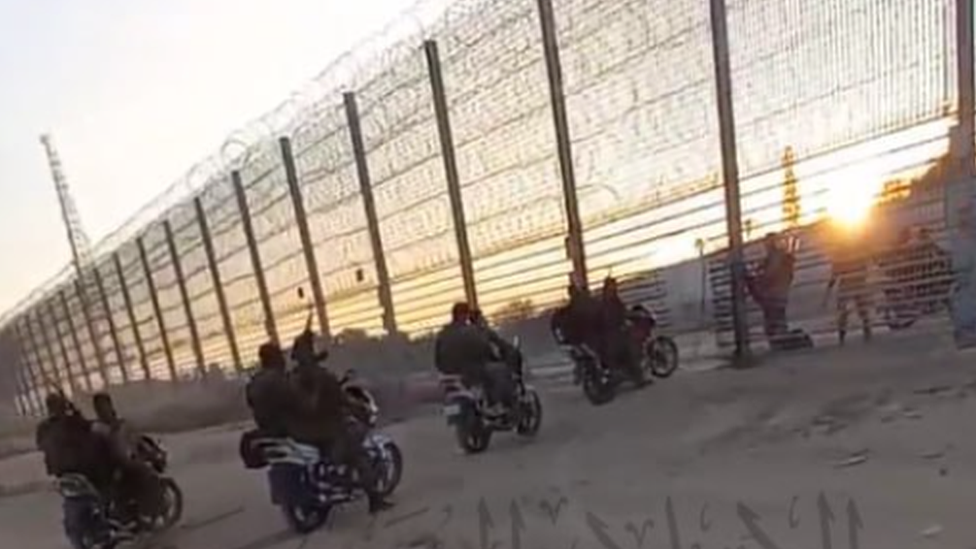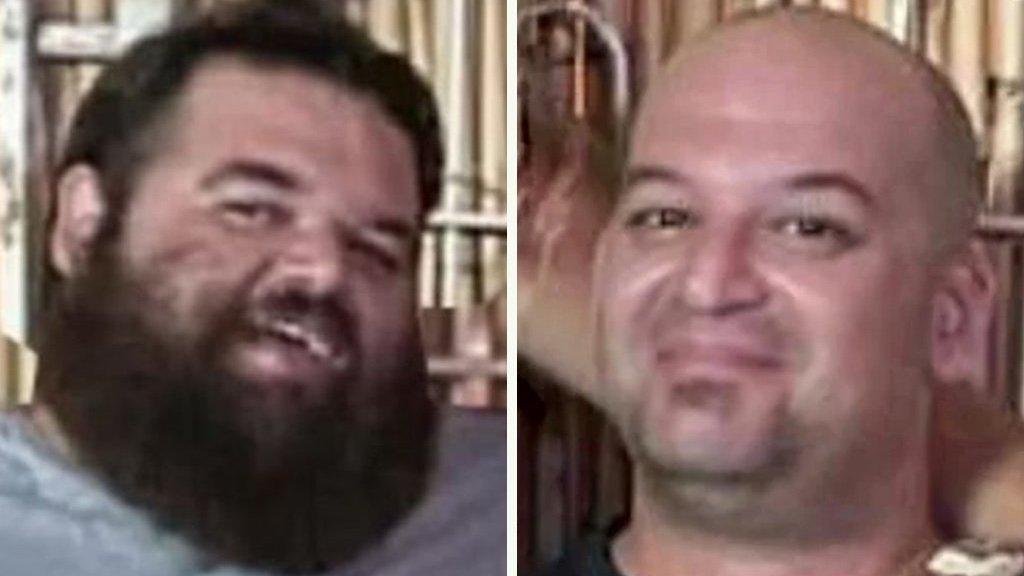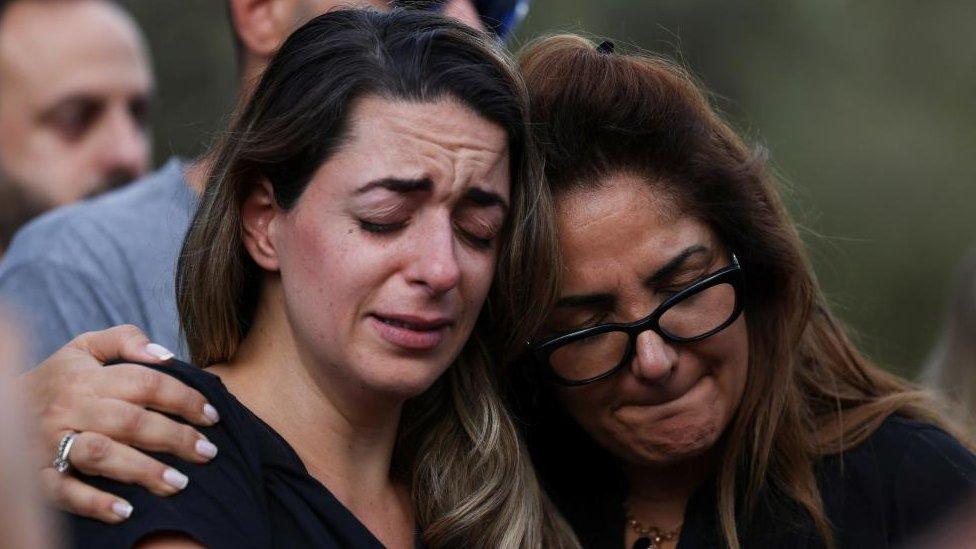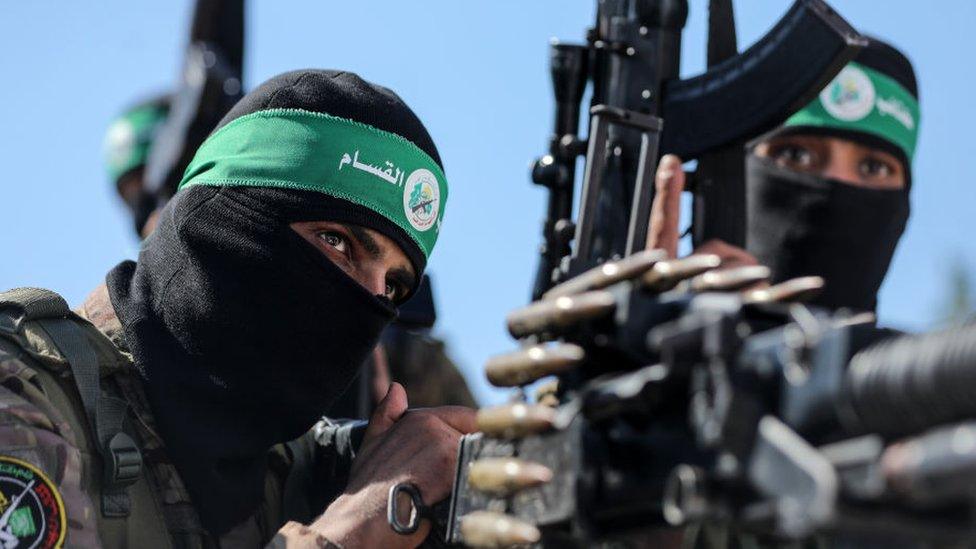News outlets deny Israeli claim that freelance journalists knew of Hamas attack
- Published

Social media footage also showed Hamas launching its attack
A number of news outlets have strongly rejected Israeli accusations that four freelance photographers they worked with in Gaza had prior knowledge of the Hamas attacks on 7 October.
Israeli minister Shlomo Karhi said "certain individuals" who had worked for Reuters, AP, CNN and the New York Times "had prior knowledge".
All four outlets have denied the claims, which have since been debunked.
The NYT said the "outrageous" accusations endangered freelancers.
Hamas launched devastating and unprecedented attacks on southern Israel on 7 October, killing more than 1,400 Israeli civilians and soldiers, and kidnapping more than 240.
Mr Karhi's comments, external followed a report on the pro-Israel website Honest Reporting, which suggested - without supporting evidence - that the photographers' presence may have been "part of the plan".
It said that the presence of the photographers on October 7 in the early hours of the attacks "raised ethical questions".
However, Gil Hoffman, Honest Reporting's executive director, has since confirmed the lack of evidence. AP quoted him on Friday as saying he was satisfied by explanations given by some of the journalists that they had no prior knowledge.
But he maintained that the site's questions were "legitimate", adding that "we don't claim to be a news organisation".
Images filed by the photographers included a burning Israeli tank, Palestinians breaching a fence at the Kfar Aza kibbutz and scenes from the attack itself.
In a statement made on X, external, formerly known as Twitter, the Israeli government's press office said the website's "disturbing findings" showed the photographers had crossed "every professional and moral red line".
Reuters, AP, CNN and the New York Times all issued statements saying there had been no arrangements in advance with any of the journalists to provide photos.
The New York Times described the accusations as "reckless, external".
"The Times has extensively covered the Oct. 7 attacks and the war with fairness, impartiality, and an abiding understanding of the complexities of the conflict," it said.
It also defended the work of freelance photojournalists in conflict areas, adding their jobs "often require them to rush into danger to provide first-hand witness accounts and to document important news.
"This is the essential role of a free press in wartime."
It said one of the photographers, Yousef Massoud, had not been working with the paper on that day but had "since done important work for us".
Associated Press said: "No AP staff were at the border at the time of the attacks, nor did any AP staffer cross the border at any time."
"When we accept freelance photos, we take great steps to verify the authenticity of the images and that they show what is purported," it added.
The agency said it was no longer working with one of the journalists, Hassan Eslaiah, who was found to have been pictured with Hamas Gaza leader Yahya Sinwar.
CNN said it had no prior knowledge of the attacks, but said it also would suspend its ties with Eslaiah.
Reuters also denied that it had prior knowledge of the attack or had "embedded journalists with Hamas" on 7 October.
On Thursday, Honest Reporting said they "did not accuse Reuters of collusion" but was rather raising "serious ethical issues regarding news outlets' association with these freelancers".
After the website's initial report, Benny Gantz, a member of Israel's war cabinet, said the photojournalists should be treated as terrorists, external if it was proven they knew in advance of the 7 October attacks.
An MP for the ruling Likud party, Danny Danon, also said the journalists would be added to a list of people marked for assassination, external because of their participation in the attacks.
Journalists are protected under international law which says they must be treated as civilians and protected as such during conflicts.
The Committee to Protect Journalists (CPJ) says at least 39 journalists and media workers have been killed since the current war began, including 34 Palestinians, four Israelis and one Lebanese.
"Journalists in Gaza face particularly high risks as they try to cover the conflict in the face of an Israeli ground assault on Gaza City, devastating Israeli airstrikes, disrupted communications, and extensive power outages," it said.

More on Israel-Gaza war
Follow live: Latest updates
From Gaza: Palestinian given two hours to evacuate whole neighbourhood
From Israel: Pain still raw a month after Hamas attacks
History behind the story: The Israel-Palestinian conflict
Related topics
- Published27 February

- Published7 November 2023

